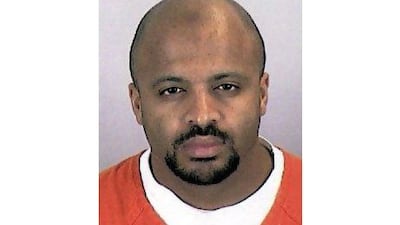Zacarias Moussaoui narrowly escaped the death penalty when he stood trial in Alexandria, Virginia, but few who followed the case can have forgotten the words of the judge when consigning him to a lifetime in a maximum security prison.
"Mr Moussaoui, you came here to be a martyr in a great big bang of glory," said Judge Leonie Brinkema. "But to paraphrase the poet T S Eliot, instead you will die with a whimper."
To Moussaoui's defiant claim that he and not the US had won, she replied: "When this proceeding is over, everyone else in this room will leave to see the sun ... hear the birds ... and they can associate with whomever they want. You will spend the rest of your life in a supermax prison. It's absolutely clear who won."
Moussaoui received six consecutive life sentences for conspiracy to commit acts of terrorism transcending national borders and conspiracy to commit air piracy, use weapons of mass destruction, murder US citizens and destroy aircraft and property.
Absent from the trial was any direct evidence, beyond his own statements, in some cases contradictory, linking him to the attacks. But there was abundant material to show Moussaoui wanted an active role in terrorist operations.
He had attended the Khalden training camp, linked to Al Qaeda, in Afghanistan. He enrolled for flight instruction in Oklahoma. He claimed at different times that he had plotted with the shoe bomber Richard Reid to hijack a plane and fly it into the White House on September 11, and alternatively that his mission in the US was to carry out some unspecified attack after that day.
But whatever he planned to do after arriving in the US in February 2001, Moussaoui did not participate in the 9/11 attacks. He was in custody in Minnesota that day for an immigration violation.
To some, including defence lawyers, Moussaoui's bizarre behaviour suggested a deranged mind. But he was declared mentally competent to stand trial; even his mother rejects the notion he was insane.
The jury found he did enter the US to learn how to fly planes "to kill as many Americans as possible". And most jurors were ready to send him to death row. He was spared because the vote was not unanimous, which is required to impose the death sentence.
Some observers have criticised the trial. But one legal observer, writing at the Jurist website on law news and research soon after sentencing, was impressed.
Jonathan Hafetz, an associate counsel at the Brennan Centre for Justice at the New York University school of law and an opponent of the US record of detaining terrorist suspects without trial, said that while Moussaoui's "venomous, disruptive outbursts and wildly unpredictable behaviour" had pitted him against his own lawyers, they battled in the highest traditions of defence advocacy to save his life.
"Yet, in the end, it was the jury system - the crown jewel of the American legal system - that triumphed, as jurors resisted the temptation to be swayed by emotion over the horrific event and imposed punishment based upon a careful consideration of the evidence presented by both sides."
Moussaoui, confined in a Colorado prison once described by a warder as a "cleaner version of hell", no longer has the means of expressing his own thoughts. The judge closed the sentencing hearing with these words: "You will never get a chance to speak again and that's an appropriate ending."
foreign.desk@thenational.ae

Moussari case lacked evidence, beyond his own admissions
Zacarias Moussaoui was convicted of involvement in September 11, 2001 attacks largely on the basis of his desire to have an active role in terrorist operations.
Most popular today
